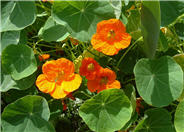
Common name:Garden Nasturtium
Botanical name:Tropaeolum majus
This annual groundcover/vine and will grow less than 1' tall, but will spread and climb up to 6' tall. Nasturtium has 2" light green leaves with edible, red, orange, yellow, or white flowers that are in constant bloom throughout the warm season. This plant usually reseeds, with new plants emerging in early spring.
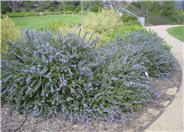
Common name:Prostrate Rosemary
Botanical name:Rosmarinus officinalis 'Prostratus'
The 'Prostratus' grows to a height of 2'-3' with a spread to 8'. Its flowers are pale, lavender blue in color; the leaves are needle-like with a dark, blue-green color. This plant makes a good groundcover, and its leaves can be used as seasoning in cooking.
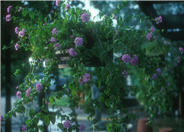
Common name:Lavender Swirl Lantana
Botanical name:Lantana montevidensis 'Lavender Swirl' T
'Lavender Swirl' is a fast growing, evergreen shrub. It has dark green, 1" long, coarsely toothed leaves, which are sometimes tinged red or purplish. Flower clusters may be in pure white, solid purple, or white-and-purple.

Common name:Bronze Loquat
Botanical name:Eriobotrya deflexa
A small, evergreen tree with large leaves that are reddish bronze and turn green as they mature, this loquat is highlighted by clusters of small, white, fragrant flowers that are borne in the spring on branch tips.
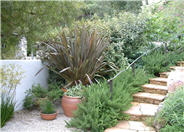
Common name:Red New Zealand Flax
Botanical name:Phormium 'Rubrum'
New Zealand Flax is an excellent accent plant for the garden. Evergreen leaves are long, narrow, and grow upright. Clusters of flowers grow on spikes above the foliage in late spring and summer. 'Rubrum' is a large, bold plant with stiff, vertical, strap-like leaves that arise from its base and are dark purplish red in color. It should be grown in full sun.
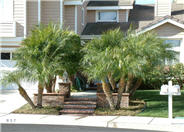
Common name:Pygmy Date Palm, Roebelin Palm
Botanical name:Phoenix roebelenii
This tree will grow to about 10' tall and has dark green, spiny petiole foliage. It does well in full sun to heavy shade; it likes moderate to heavy irrigation, but can take periods of dryness.
| Designer: | Stacked Flower Containers |
Photographer: GardenSoft |
Soils and Compost:
Practice grass-cycling by leaving short grass clippings on lawns after mowing, so that nutrients and organic matter are returned to the soil.
Water Saving Tip:
Replace turf with groundcovers, trees, and shrubs. If you have areas where no one uses the grass, patches that do not grow well, or a turf area too small to water without runoff, consider replacing the turf with water-efficient landscaping.
Integrated Pest Management:
Remove irrigation water and fertilizer from areas where you don't want weeds to grow.

